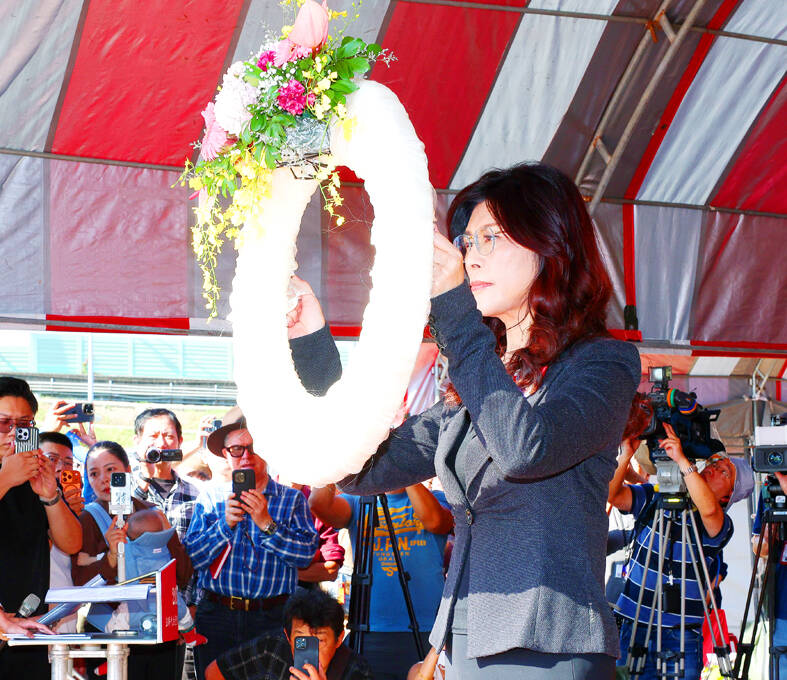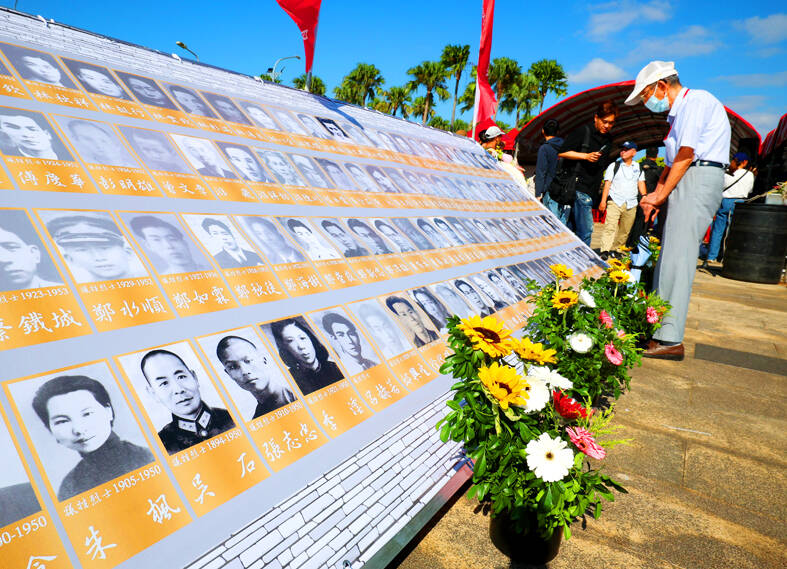A memorial in Taipei yesterday honored people killed during the White Terror era and was not to commemorate a Chinese Communist Party (CCP) spy, Chinese Nationalist Party (KMT) Chairwoman Cheng Li-wen (鄭麗文) said on Facebook.
Wu Shi (吳石), a lieutenant general who was the Ministry of National Defense’s deputy chief of the general staff, was executed after being convicted as a CCP spy during the White Terror era.
Wu was accused of providing the CCP with critical intelligence on KMT troop deployments in southeast China, southern China and Taiwan when the KMT government was based in Nanjing, China, Taiwan Human Rights Memory Bank documents showed.

Photo: CNA
Cheng said she was invited to attend the ceremony at Machangding Memorial Park (馬場町紀念公園) in Taipei’s Wanhua District (萬華) — where Wu was executed — by the Political Victims Mutual Aid Association.
The event was to commemorate people killed during the White Terror period, Cheng said, adding that media reports about the event being a commemoration of Wu were misleading.
The invitation she received did not mention Wu, she said.

Photo: CNA
Many people paid the price for their political and ideological beliefs, but Wu is not what we would define as a “political criminal,” she said.
Wu was depicted in promotional material and at the event, while a portrait of him bearing the label “martyred hero” was displayed alongside others in an area where the public could offer flowers and pay their respects.
History should be remembered, so that society can be at peace and people can strive for prosperity, the association said.
A KMT legislator, commenting on condition of anonymity, said it was evident that Cheng had received a version of the invitation that did not mention Wu, with the event appearing to be a White Terror commemoration event.
If what Cheng said is true, she would need to take more care in selecting her staff, the source said, adding: “Her attendance represented the KMT.”
Former KMT lawmaker Alex Tsai (蔡正元) said that the White Terror era was the result of investigations into a list of 1,800 people named by CCP member Tsai Hsiao-chien (蔡孝乾).
While the crimes did not merit the death penalty, the KMT and the CCP were fighting the Chinese Civil War at the time, with the CCP attempting to overthrow the KMT government, Tsai said.
The definition of “political victim” is subjective, Tsai said, adding that to date, he has not witnessed any Chinese leader commemorating KMT political victims.
For head of the KMT to honor “heroes” who were attempting to subvert the KMT government is indeed a masterpiece in reversing the historical position of the KMT, he said, adding sarcastically that the KMT might as well change its name to the “Chinese Nationalist Surrender Party.”
National Chengchi University professor of history Hsueh Hua-yuan (薛化元) said that most of the people killed in the White Terror were innocent, but there were a few who had moved with the KMT to Taiwan to act as the CCP’s “eyes and ears.”
Wu was one of those people, Hsueh said.
Commemorating a spy who worked for an enemy government seeking to undermine national security is logically questionable, and the head of the KMT, as one of the major parties, should exercise more care when attending such events lest their actions be seen as the party’s official attitude toward the CCP, he said.
Additional reporting by Liu Wan-lin, Lee Wen-hsin and Fang Wei-li

Beijing could eventually see a full amphibious invasion of Taiwan as the only "prudent" way to bring about unification, the US Department of Defense said in a newly released annual report to Congress. The Pentagon's "Annual Report to Congress: Military and Security Developments Involving the People's Republic of China 2025," was in many ways similar to last year’s report but reorganized the analysis of the options China has to take over Taiwan. Generally, according to the report, Chinese leaders view the People's Liberation Army's (PLA) capabilities for a Taiwan campaign as improving, but they remain uncertain about its readiness to successfully seize

Taiwan is getting a day off on Christmas for the first time in 25 years. The change comes after opposition parties passed a law earlier this year to add or restore five public holidays, including Constitution Day, which falls on today, Dec. 25. The day marks the 1947 adoption of the constitution of the Republic of China, as the government in Taipei is formally known. Back then the Chinese Nationalist Party (KMT) governed China from Nanjing. When the KMT, now an opposition party in Taiwan, passed the legislation on holidays, it said that they would help “commemorate the history of national development.” That

Trips for more than 100,000 international and domestic air travelers could be disrupted as China launches a military exercise around Taiwan today, Taiwan’s Civil Aviation Administration (CAA) said yesterday. The exercise could affect nearly 900 flights scheduled to enter the Taipei Flight Information Region (FIR) during the exercise window, it added. A notice issued by the Chinese Civil Aviation Administration showed there would be seven temporary zones around the Taiwan Strait which would be used for live-fire exercises, lasting from 8am to 6pm today. All aircraft are prohibited from entering during exercise, it says. Taipei FIR has 14 international air routes and

The Ministry of National Defense (MND) today released images of the military tracking China’s People's Liberation Army (PLA) movements during the latest round of Chinese drills around Taiwan. The PLA began "Justice Mission 2025" drills today, carrying out live-fire drills, simulated strikes on land and maritime targets, and exercises to blockade the nation's main ports. The exercises are to continue tomorrow, with the PLA announcing sea and air space restrictions for five zones around Taiwan for 10 hours starting from 8:30am. The ministry today released images showing a Chinese J-16 fighter jet tracked by a F-16V Block 20 jet and the